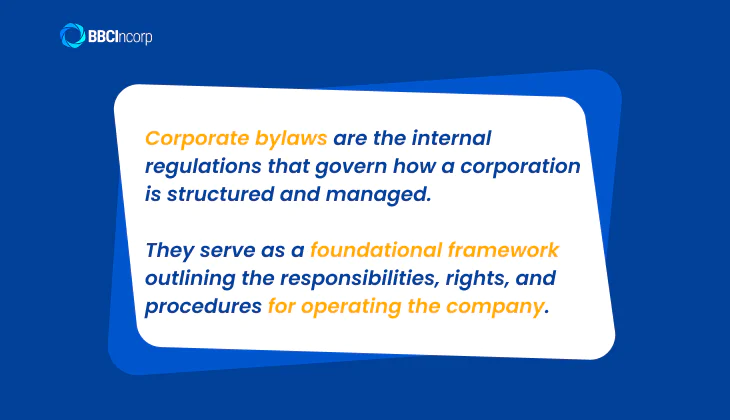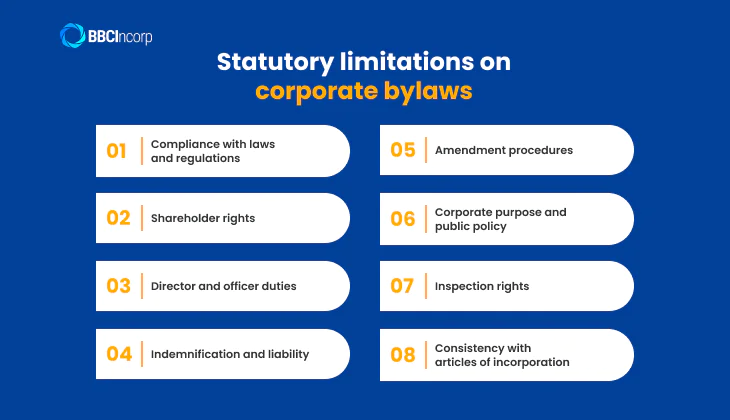
Table of Contents
Corporation bylaws play a central role in shaping how a business operates and makes decisions. Whether you are launching a startup, managing a small business, or leading an established corporation, having clear and well-drafted business bylaws is essential. But what are corporate bylaws, and why do they matter?
At their core, bylaws are internal rules that govern how a company functions. They outline the roles and responsibilities of directors and officers, how meetings are held, how votes are conducted, and how conflicts are resolved.
This structure not only supports effective leadership but also helps with legal compliance and operational consistency in the U.S.
In today’s article, as we explore each part of corporate bylaws, you will see how they lay the foundation for strong corporate governance and long-term success across all types of businesses.
What are corporation bylaws?
Let’s begin by exploring what corporate bylaws are and their main objectives.
Definition and core purpose
Corporate bylaws are the internal regulations that govern how a corporation is structured and managed. Also known as entity rules or operational guidelines, they serve as a foundational framework outlining the responsibilities, rights, and procedures for operating the company.
If the articles of incorporation establish the firm as a legal entity, the corporate bylaws define its internal functioning.
Unlike articles of incorporation, which are filed with the state, bylaws are typically adopted internally by the board of directors and are not submitted to any government body.

What do bylaws typically include?
Primarily, the business bylaws of a corporation define the structure and authority of the board of directors and corporate officers. This covers outlining how many directors will serve, their election process, their powers and responsibilities, and the duration of their terms. The bylaws also identify officer roles such as president, treasurer, and secretary, clarifying their duties.
Secondly, they establish rules for meetings and voting. This segment details how board and shareholder gatherings are scheduled, how attendees are notified, what constitutes a quorum, and how votes are executed and recorded. These guidelines assist in ensuring equitable decision-making and operational consistency.
Third, business governance documents frequently contain provisions related to the issuance and transfer of shares. They explain how stock is released, how ownership is tracked, and the method for transferring shares to others. These regulations help maintain order and clarity in the company’s ownership arrangement.
Finally, the business bylaws provide a method for making adjustments. Over time, as the enterprise develops, modifications may be required. A standard bylaw document includes guidelines for how alterations can be proposed, reviewed, and approved by the board or shareholders.
Are bylaws required for a corporation?
Company bylaws are legally required for corporations in many states, particularly for C corporations and S corporations. These internal documents are typically adopted after incorporation and provide the foundation for how a company is governed.
While not filed with the state, corporation bylaws are often necessary to meet regulatory expectations and demonstrate proper internal structure.
Why corporate bylaws matter
Corporate bylaws help establish that a business operates as a separate legal entity. This distinction is essential for maintaining limited liability protection and is closely examined during legal proceedings, audits, and investment reviews.
The bylaws of a corporation show that decisions follow a clear and consistent process, which strengthens the company’s credibility with courts, banks, and other institutions.
Not required for sole proprietorships and most LLCs
Sole proprietorships are not required to create company bylaws, since the business and the owner are legally the same. Limited liability companies are not usually obligated to draft corporate bylaws either, but using a similar internal document, such as an operating agreement, is highly recommended to define responsibilities and support long-term stability.
Bylaws support clarity and control
Bylaws for a corporation are especially important when there are multiple shareholders or directors. They set procedures for meetings, voting, officer roles, and share management, which helps prevent misunderstandings and supports smoother decision making.
When leadership changes or strategic issues arise, these guidelines let the company remain aligned and compliant.
Corporate bylaws also include rules for making amendments, allowing the business to adapt to new circumstances without confusion or conflict. This flexibility is critical as a company scales or brings in new stakeholders.
Even in states where corporation bylaws are not strictly required by law, having them in place is a practical necessity. Understanding what are bylaws for corporation management is a vital step for any business aiming to grow responsibly and operate with confidence.
Key elements of corporate bylaws
While each company may tailor its company bylaws meaning based on size, industry, and jurisdiction, most include a common set of provisions crucial for day-to-day management and long-term strategic planning. Below are the vital components typically found within these governing documents.
Corporate Purpose
Purpose of bylaws clearly articulates the corporation’s mission or the specific nature of its business endeavors. It provides essential direction for all decision-making and clarifies the company’s legally authorized activities.
A well-defined purpose helps align board members, officers, and shareholders with the entity’s overarching strategic objectives.
Principal Office Location
Bylaws of a corporation must specify the address of the company’s principal office. This address commonly serves as the official location for receiving legal notices and where corporate records are maintained.
Listing the principal office helps authorities and stakeholders confirm the company’s legal presence within its jurisdiction.
Board of Directors
The business must detail the board’s structure, including the number of directors, their election or removal process, term lengths, and specific responsibilities.
Board of directors bylaws define the chain of authority and make sure that directors fulfill their legal obligations in overseeing the corporation’s performance and compliance with regulations.
Officers and Their Roles
Corporate bylaws explicitly designate the roles of key officers, such as the Chief Executive Officer (CEO), Chief Financial Officer (CFO), and Secretary.
Each position’s responsibilities, authority levels, and reporting lines are clearly defined. Thanks to this approach, internal management is organized, efficient, and accountable.
Shareholder Meetings
Bylaws for business provide precise instructions on how to call and conduct shareholder meetings, encompassing both annual and special gatherings. They specify requirements for notice periods, quorum attendance, and voting procedures.
This ensures that all decisions involving shareholders are both valid and legally enforceable.
Director and Officer Meetings
The bylaws establish clear procedures for board and committee meetings. This includes guidelines on how meetings are scheduled, what constitutes a quorum for valid decisions, and the methods by which votes are conducted.
This structured approach promotes consistent decision-making and maintains leadership alignment.
Voting Rights and Procedures
This crucial segment outlines the mechanics of voting for both shareholders and directors. It details how votes are counted, the majority needed for proposal approval, and how tie votes are resolved.
Several bylaws also incorporate rules for proxy voting, facilitating participation even when individuals cannot attend meetings in person.
Stock Structure and Issuance
The bylaws delineate the types and classes of stock the corporation is authorized to issue, the total number of authorized shares, and any restrictions on their transfer or sale.
Clear guidelines in this area are vital for effective ownership management and compliance with legal disclosure requirements.
Conflict of Interest Policy
Corporate bylaws typically include explicit rules for identifying and resolving potential conflicts of interest. This provision ensures that directors and officers consistently act in the company’s best interest, upholding ethical standards in all decision-making processes.
Amendment Procedures
Bylaws must be capable of evolving with the company’s growth and changing needs. This section defines how amendments can be proposed, identifies who has the authority to initiate them, and specifies the required approval process.
Formal amendment rules prevent confusion and support transparency.
Record Keeping and Corporate Books
This section details the requirements for maintaining accurate corporate records, including minutes from meetings, comprehensive shareholder lists, and up-to-date financial statements. Proper documentation is essential for ensuring accountability and demonstrating legal compliance.
Indemnification Clauses
To protect directors and officers from personal liability related to their official duties, many bylaws for corporations include indemnification provisions. These clauses specify the conditions under which the company will cover legal expenses or damages incurred by its leadership.
Together, each of the mentioned components contributes significantly to establishing a well-governed and stable business entity.
How to create bylaws for a corporation
Though not required to be filed with the state, bylaws are a legal necessity for C corporations and S corporations in most states. They are often requested by banks, investors, and regulators and play a critical role in maintaining legal and operational clarity.
Here is a step-by-step guide for creating effective corporate bylaws in the U.S.

Step 1: Draft the bylaws document
The drafting process typically begins after the corporation files its Articles of Incorporation with the state. Founders, a designated incorporator, or legal counsel can prepare the bylaws.
Some startups use templates available through reputable legal platforms, but it is advisable to consult an attorney in the specific state. For example, Delaware, California, and New York each have specific governance rules that may affect how bylaws should be structured.
The bylaws should clearly define the rights and responsibilities of directors and officers, rules for calling meetings, procedures for voting, stock issuance terms, and conflict of interest policies.
Step 2: Get approval from the board of directors
Once the bylaws are drafted, they must be adopted by the corporation’s initial board of directors at the first official board meeting. In the U.S., this approval is usually documented in the meeting minutes and signed by the board secretary. Without formal adoption, the bylaws hold no legal authority.
Approval ensures that the bylaws of the corporation reflect the board’s agreement on how the company should operate. Some states (e.g., California, Delaware or New York) may also require a unanimous vote at this stage, depending on the corporation’s structure.
Step 3: Record and store the bylaws
Although corporate bylaws are not filed with the Secretary of State, they must be securely stored in the company’s corporate records book or registered agent’s system. In the U.S., corporations are legally required to maintain accurate and accessible internal records.
Banks, insurance providers, and venture capital firms often request a copy of the bylaws to confirm decision-making processes, stock authorization rules, and officer authority before entering into formal agreements.
Step 4: Review and update as needed
As the business evolves, the bylaws for corporation governance may need to be updated. Changes in the board structure, equity financing, or voting procedures often require amendments. U.S. corporate law permits amendments as long as the process is defined in the original bylaws.
Most bylaws include provisions detailing how updates can be proposed and approved, typically requiring a majority or two-thirds vote from the board or shareholders. By that, regular reviews are needed for staying aligned with legal requirements and business goals.
Statutory limitations on corporate bylaws
Bylaws for a corporation must align with a wide range of legal standards. Understanding these statutory limitations is essential to ensure these policies support governance without overstepping legal or ethical boundaries.

Compliance with laws and regulations
All corporate bylaws must comply with applicable state and federal laws, including those governing securities, employment, and anti-discrimination. For example, a bylaw cannot restrict equal employment opportunities or override SEC disclosure rules.
In some cases, international laws may also apply if the corporation operates across borders. Any provision that violates public law will be considered void, regardless of board or shareholder approval.
Shareholder rights
Bylaws for a corporation cannot strip shareholders of essential rights such as voting, receiving dividends, or accessing financial information. While bylaws may regulate how and when votes are conducted, they cannot cancel voting rights altogether.
Courts often strike down any bylaws that attempt to reduce or eliminate shareholder influence contrary to statutory protections.
Director and officer duties
What are corporate bylaws allowed to do when it comes to corporate leadership? They may define roles and responsibilities, but they cannot waive fiduciary duties like the duty of care and loyalty.
Directors and officers are legally required to act in the best interests of the corporation. Any bylaw that attempts to excuse negligence, fraud, or self-dealing is unenforceable.
Indemnification and liability
Many corporate bylaws of corporation documents include indemnity clauses to protect directors and officers from liability.
However, indemnification must comply with state corporate law, which prohibits covering intentional misconduct or criminal behavior.
For instance, Delaware law allows indemnity under specific conditions but clearly excludes fraudulent actions.
Amendment procedures
Changes to the bylaws must follow a lawful process, typically involving board and shareholder approval. The bylaws themselves should outline this process, but it must also align with state law.
Some states require shareholder approval for certain types of amendments, even if the bylaws say otherwise.
Corporate purpose and public policy
Corporate bylaws cannot promote illegal or unethical activity. Any clause that encourages action contrary to public policy, such as discriminatory hiring or fraudulent reporting, is invalid.
Inspection rights
Bylaws cannot prevent directors or shareholders from inspecting the corporation’s records. Most state laws provide broad inspection rights, especially for financial statements and board minutes. Attempting to limit these rights could lead to legal challenges.
Consistency with articles of incorporation
In the comparison of bylaws vs articles of incorporation, the latter always prevails in case of conflict. Bylaws must be consistent with the articles filed with the state. If contradictions arise, courts uphold the articles as the controlling document.
Corporation bylaws vs. Articles of Incorporation
While the articles legally create the corporation, the bylaws for corporate governance define how it functions day to day.
Articles of Incorporation (sometimes called a certificate of incorporation) are filed with the state to formally register a corporation. This public document includes basic legal details such as the corporate name, business purpose, registered agent, and number of authorized shares.
Filing the articles of incorporation is a legal requirement in most states, marking the official formation of a corporation.
Corporate bylaws, on the other hand, are internal rules adopted by the board of directors after incorporation. They are not filed with the state but are essential for managing corporate operations.
The corporate bylaws definition includes governance structures, voting procedures, officer roles, and meeting guidelines.
Key differences between articles and bylaws
| Feature | Articles of Incorporation | Corporate Bylaws |
|---|---|---|
| Filing Requirement | Filed with the Secretary of State | Not filed, kept internally |
| Legal Status | Legally forms the corporation | Guides internal governance |
| Public vs. Private | Public document | Private corporate record |
| Contents | Name, purpose, stock, registered agent | Board structure, meetings, voting rules, and officer duties |
When and why each is used
The articles are created during the formation stage to give the corporation legal standing. Without them, a corporation is not recognized as a legal entity by the state and cannot conduct business or enter into contracts.
Bylaws are adopted immediately after formation, often at the first board meeting. They answer the question: What are bylaws for a corporation? They define how internal decisions are made, how meetings are conducted, and how responsibilities are delegated.
While not required in all jurisdictions, bylaws are commonly necessary to open corporate bank accounts, secure financing, and maintain good governance.
Why both documents matter
Articles of incorporation give your business legal existence. Without them, the corporation does not formally exist in the eyes of the state. They serve as the foundation for registering your company, issuing stock, and conducting business under corporate status.
By contrast, corporation bylaws make the business operational. They define how decisions are made, meetings are run, and responsibilities are assigned. Bylaws for a corporation provide clarity and consistency in governance.
Together, these two documents create a strong legal and organizational framework. Both are vital to build credibility, meet legal requirements, and run your company effectively.
Common mistakes and how to avoid them
Comprehending what are the bylaws of a corporation is paramount for constructing a well-governed and legally compliant business entity.
Despite this, many organizations make missteps that compromise the efficacy of these foundational documents and heighten operational exposure.
Below, we will explore common pitfalls and strategies to steer clear of them.
Using generic templates without customization
One frequent issue is relying on one-size-fits-all templates when creating bylaws for corporate operations. These documents often miss important details specific to the business structure, industry, or state regulations.
For example, a tech startup may require different voting rights or officer roles compared to a manufacturing firm. While templates can help you get started, they should always be reviewed and adjusted with legal guidance.
Not updating bylaws after key changes
Bylaws are living documents. Failing to update them after structural changes, such as bringing on new investors or appointing new officers, can lead to confusion and potential noncompliance. Inconsistent or outdated provisions may also be challenged by shareholders or regulators.
Lack of clarity in roles and voting procedures
Another common problem is unclear definitions for officer duties, voting thresholds, or meeting protocols. If the bylaws of a corporation do not clearly state how decisions are made or who has authority, internal disputes may arise.
Clear, precise language helps prevent misunderstandings and supports smoother governance.
Best practices to stay on track
To avoid these problems, businesses should take a proactive approach. Start by drafting customized bylaws with input from experienced counsel. Next, make sure the board of directors reviews them periodically, especially after major company events.
Finally, document and store all approved changes for transparency and future reference.
Effective bylaws for corporate leadership do more than fulfill legal requirements. They set the foundation for how the business runs, how decisions are made, and how responsibilities are shared. Getting them right protects your company and supports long-term success.
Conclusion
For a well-structured and legally compliant business, corporation bylaws are indispensable. They precisely dictate how decisions are made, delineate who holds power, and govern internal workflows. Knowing their significance empowers business owners to confidently manage pivotal moments.
Whether you’re launching a new firm or enhancing an established one, clear, up to date corp bylaws minimize disagreements, promote openness, and solidify accountability throughout your enterprise.
Should you require more help, expert assistance is advisable. At BBCIncorp, we provide specialized guidance and dependable services for drafting or revising your bylaws. Don’t hesitate to reach out to service@bbcincorp.com for assistance today.
Frequently Asked Questions
Are LLCs required to have bylaws?
Limited liability companies (LLCs) are generally not required to have corporate bylaws like corporations, but they often create similar documents called operating agreements. These agreements serve many of the same purposes as bylaws by outlining the management structure, member roles, decision-making processes, and other internal rules.
While operating agreements are not always legally mandatory, having one helps clarify expectations among members, prevent disputes, and establish clear guidelines for the LLC’s operations. In some states, an operating agreement is strongly recommended and may even be required to comply with local laws or for tax purposes.
Overall, although LLCs do not use bylaws in the traditional sense, adopting a well-drafted operating agreement is a best practice for smooth governance and legal protection.
Who can view your company’s bylaws?
The company’s bylaws are typically considered internal documents, but certain parties have the right to access them. Generally, shareholders, directors, and officers can review the bylaws to understand the rules governing the corporation. In some cases, state laws may require that bylaws be made available to shareholders upon request.
Additionally, during legal disputes or regulatory investigations, bylaws may be examined by outside parties such as courts or government agencies. While bylaws are not usually filed publicly like articles of incorporation, maintaining transparency with key stakeholders helps promote trust and smooth governance.
Disclaimer: While BBCIncorp strives to make the information on this website as timely and accurate as possible, the information itself is for reference purposes only. You should not substitute the information provided in this article for competent legal advice. Feel free to contact BBCIncorp’s customer services for advice on your specific cases.
Industry News & Insights
Get helpful tips and info from our newsletter!
Stay in the know and be empowered with our strategic how-tos, resources, and guidelines.





